
"Folsom Prison Blues" is a song by American singer-songwriter Johnny Cash. Written in 1953, it was first recorded and released as a single in 1955, and later included on his debut studio album Johnny Cash with His Hot and Blue Guitar! (1957), as the album's eleventh track. Borrowing liberally from Gordon Jenkins' 1953 song, "Crescent City Blues", the song combines elements from two popular folk styles, the train song and the prison song, both of which Cash continued to use for the rest of his career. It was one of Cash's signature songs. Additionally, this recording was included on the compilation album All Aboard the Blue Train (1962). In June 2014, Rolling Stone ranked it No. 51 on its list of the 100 greatest country songs of all time.
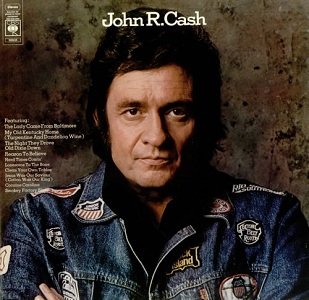
John R. Cash is the 51st overall album by country singer Johnny Cash, released in 1975 on Columbia Records. It consists mostly of covers of other musicians' songs. The first track on the album, a song titled "My Old Kentucky Home", is not the state song of Kentucky, but a composition by Randy Newman which had been previously recorded by the Osborne Brothers in 1970 and Three Dog Night in 1972; Cash's version, like that of the Osborne Brothers five years previous, was released as the second single from the album, though the previously issued single "The Lady Came from Baltimore" had achieved greater success on the charts, reaching #14. The Cash original "Lonesome to the Bone" had previously appeared on Ragged Old Flag (1974) and would make one more appearance on Silver (1979).

Johnny Cash at San Quentin is the 31st overall album and second live album by American singer-songwriter Johnny Cash, recorded live at San Quentin State Prison on February 24, 1969, and released on June 16 of that same year. The concert was filmed by Granada Television, produced and directed by Michael Darlow. The album was the second in Cash's conceptual series of live prison albums that also included At Folsom Prison (1968), På Österåker (1973), and A Concert Behind Prison Walls (1976).
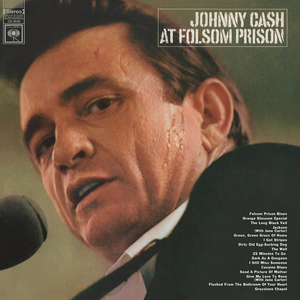
Johnny Cash at Folsom Prison is the first live album by American singer-songwriter Johnny Cash, released on Columbia Records on May 6, 1968. After his 1955 song "Folsom Prison Blues", Cash had been interested in recording a performance at a prison. His idea was put on hold until 1967, when personnel changes at Columbia Records put Bob Johnston in charge of producing Cash's material. Cash had recently controlled his drug abuse problems, and was looking to turn his career around after several years of limited commercial success. Backed by June Carter, Carl Perkins, and the Tennessee Three, Cash performed two shows at Folsom State Prison in California on January 13, 1968. The initial release of the album consists of fifteen songs from the first show and two from the second.

The Tennessee Three was the backing band for singer Johnny Cash for nearly 25 years; he was known especially for his country/rockabilly style, although he won awards in numerous categories. In 1980, he reorganized the group, expanding it and naming it the Great Eighties Eight. The band provided the unique backing that would come to be recognized by fans as "the Johnny Cash sound."
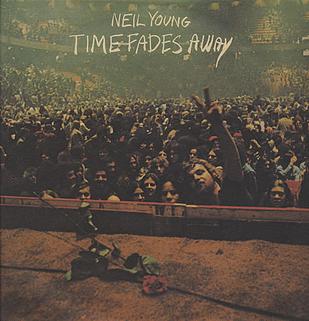
Time Fades Away is a 1973 live album by Canadian-American musician Neil Young. Consisting of previously unreleased material, it was recorded with the Stray Gators on the support tour following 1972's highly successful album Harvest. Due to Young's dissatisfaction with the tour, it was omitted from his catalogue and not released on compact disc until 2017. The album is the first of the so-called "Ditch Trilogy" of albums that Young recorded following the major success of Harvest, whereupon the scope of his success and acclaim became so apparent that Young subsequently experienced alienation from his music and career.
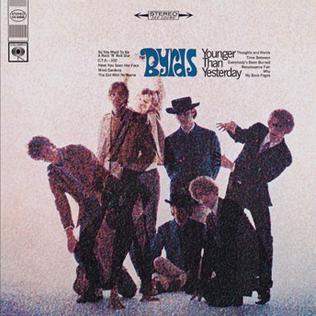
Younger Than Yesterday is the fourth studio album by the American rock band the Byrds and was released on February 6, 1967, on Columbia Records. It saw the band continuing to integrate elements of psychedelia and jazz into their music, a process they had begun on their previous album, Fifth Dimension. In addition, the album captured the band and record producer Gary Usher experimenting with new musical textures, including brass instruments, reverse tape effects and an electronic oscillator.

Safe at Home is a 1968 album by country rock group the International Submarine Band, led by the then-unknown 21-year-old Gram Parsons. The group's only album release, Safe at Home featured four of Parsons' original compositions rounded out by six covers of classic country and rock and roll songs made famous by the likes of Johnny Cash, Elvis Presley, Merle Haggard, and Hank Snow. Described as "hippie and hillbilly in equal measure", the album helped to forge the burgeoning country rock movement of the late 1960s and early 1970s.

Dr. Byrds & Mr. Hyde is the seventh studio album by the American rock band the Byrds and was released in March 1969 on Columbia Records. The album was produced by Bob Johnston and saw the band juxtaposing country rock material with psychedelic rock, giving the album a stylistic split-personality that was alluded to in its title. It was the first album to feature the new band line-up of Clarence White (guitar), Gene Parsons (drums), John York (bass), and founding member Roger McGuinn (guitar). Dr. Byrds & Mr. Hyde is unique within the band's discography for being the only album on which McGuinn sings the lead vocal on every track.
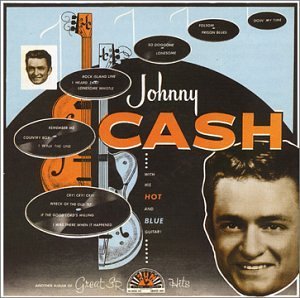
Johnny Cash with His Hot and Blue Guitar! is the debut studio album by American singer Johnny Cash, released on October 11, 1957. The album contained four of his hit singles: "I Walk the Line," "Cry! Cry! Cry!," "So Doggone Lonesome," and "Folsom Prison Blues." It was re-issued on July 23, 2002, as an expanded edition, under the label Varèse Vintage, containing five bonus tracks, three being alternate versions of tracks already on the original LP. In 2012, Columbia Records reissued the album with 16 additional non-album Sun Records tracks as part of its 63-disc Johnny Cash: The Complete Columbia Album Collection box set. In 2017, 60 years after the original release, the album was remastered under the title Johnny Cash with His Hot and Blue Guitar! . In 2022, Sun released a remastered edition of the original studio album, with only the original track listing. The songs had been remastered as to simulate being in the studio as the tracks were recorded.

Unearthed is a box set by American country singer Johnny Cash. It was released by American Recordings on November 25, 2003, two months after Cash's death. The album was compiled by Cash and Rick Rubin, who also produced the set. It was certified Gold on December 2, 2004, by the Recording Industry Association of America.

Boom Chicka Boom is the 76th album by American country music singer Johnny Cash, released in 1990 on Mercury Records. The title refers to the sound that Cash's backing band, the Tennessee Three, were said to produce. It includes a cover of Harry Chapin's "Cat's in the Cradle", and a song written by Elvis Costello for Cash, "Hidden Shame". "Don't Go Near the Water" is a re-recorded version and its original had been recorded for Ragged Old Flag. It discusses the issue of pollution of the environment. In 2003, Mercury released Boom Chicka Boom paired with Johnny Cash is Coming to Town on a single compact disc, though the bonus track "Veteran's Day" was left off. "Farmer's Almanac" and "Cat's in the Cradle" were released as singles, but failed to chart; the album itself, however, reached No. 48 on the country charts. The album has backing vocals by Elvis Presley's old backing group The Jordanaires, and Cash's mother.

Old Golden Throat is the 28th album by country singer Johnny Cash. It was released in 1968 and is a collection of mostly previously released songs. Nine of the fourteen tracks had previously appeared on Billboard's country singles chart.

The Holy Land is a concept album, the third gospel album and 30th overall album by country singer Johnny Cash, released on Columbia Records in 1969. He recorded the album inspired by a visit to Israel with his wife, June Carter Cash and in fact most of the album consists of on-site recordings made by Cash using a portable tape recorder during a visit describing what he sees as he visits holy sites in and around Jerusalem. The remainder of the album consists of gospel songs. All but three of the songs were written by Cash, though the sole single, "Daddy Sang Bass", which reached No. 1 on the Country charts and remained that spot for six weeks, was penned by Carl Perkins.

Johnny Cash Is Coming to Town is the 73rd album by American country singer Johnny Cash, released in 1987, and his first for Mercury Records. It was re-released in 2003, paired with Boom Chicka Boom on a single CD. "Sixteen Tons" was previously a hit for Tennessee Ernie Ford, "The Big Light" is an Elvis Costello song from his album King of America, released the previous year and "Let Him Roll" is from Guy Clark's debut, Old No. 1. The album reached #36 on the country charts, while the only released single, "The Night Hank Williams Came to Town", peaked at #43.

Dick's Picks Volume 7 is the seventh live album in the Dick's Picks series of releases by the Grateful Dead. It was recorded on September 9, 10, and 11, 1974 at Alexandra Palace in London, England. It was released in March 1997.

Sunday Morning with Nat Stuckey and Connie Smith is the second collaborative studio album by American country artists Nat Stuckey and Connie Smith. It was released in January 1970 via RCA Victor and contained 11 tracks. The disc was a collection of country gospel songs performed as duets by both artists. It was the pair's first album of religious music. Among the album's recording was the song "If God Is Dead ". Released as a single, the song charted in the top 60 of the American country chart in 1970. The album received a positive review from Billboard magazine following its release. In 2002, the album was re-released under the title God Will and included a twelfth track.

Beyond the Sun is the eleventh studio album by Chris Isaak, released through Vanguard Records on October 18, 2011. It is a collection of songs recorded by Sun Records artists Elvis Presley, Johnny Cash, Roy Orbison, Carl Perkins and Jerry Lee Lewis. Some of the songs were originally released on Sun Records. The record itself was recorded at Sun Studio, Memphis, Tennessee and the cover photograph was taken by Sheryl Louis outside the studio on Union Avenue.

"You Can Go Home" is a song by the American country rock band The Desert Rose Band, which was released in 1991 as the lead single from their fourth studio album True Love. It was written by Chris Hillman and Jack Tempchin, and produced by Tony Brown.
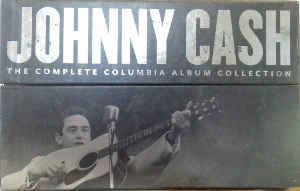
The Complete Columbia Album Collection is a box set by country singer Johnny Cash, released posthumously in 2012 on Columbia Records and Legacy Recordings.




















